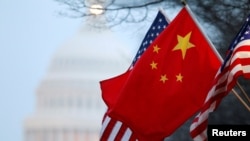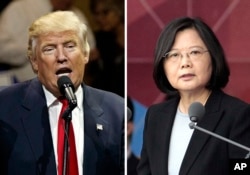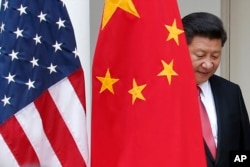Whether as a candidate or as president, Donald Trump’s remarks and actions, including some of his personnel appointments, make many China observers believe that Sino-U.S. relations will deteriorate sharply, and that the two countries may even head toward a collision.
From harsh criticism on China’s trade practices to breaking longstanding diplomatic protocol to take a phone call from Taiwanese President Tsai Ing-wen, from questioning the very foundation of U.S.-China relations - the One China policy - to appointing well-known China hawks for important trade positions, President Trump seems to be signaling that he intends to shake up the relationship considered to be the world’s most important and most consequential, especially on the trade front.
Some trade experts believe a trade war between the world’s two biggest economies is inevitable.
Alan Tonelson is the founder of the RealityChek blog, and who served as a research fellow at the U.S. Business and Industry Council.
“If the Chinese leaders want to suffer major losses that will affect their lives, then go right ahead to have a major trade war with the U.S. because that’s exactly what’s going to happen,” Tonelson told VOA in a telephone interview.
And yet, to some others, there are more serious problems than a possible trade war, such as an inadvertent escalation of tensions on the Taiwan issue.
But some China analysts argue that 2017 is the wrong year for Trump to provoke China because Beijing is on the cusp of a leadership change that may make it particularly sensitive to external provocations.
As Ian Bremmer, president of the Eurasia group, a political risk consultancy, wrote in the latest report, Top Risks 2017, China’s scheduled leadership transition will shape its political and economic trajectory for a decade or more.
Due to the conventional rule governing the retirement age of Chinese top leaders, five of the seven members of the Politburo Standing Committee, China’s top leadership body, may retire before the twice-a-decade party congress, leaving only President Xi Jinping and Premier Li Keqiang remaining.
“The scale of elite turnover before, during and after the upcoming 19th Party Congress, combined with the divisive political environment that President Xi Jinping has fostered, will make this transition one of the most complex events since the beginning of China's reform era,” said the report.
Xi “will be extremely sensitive to external challenges to his country’s interests at a time when all eyes are on his leadership,” Bremmer writes. “The Chinese president will be more likely than ever to respond forcefully to foreign policy challenges.”
Domestically, Xi’s anticorruption campaign has sent shockwaves through a system lubricated for decades by patronage and graft, and leaders in Beijing and the provinces are paralyzed by fear of becoming targets.
Zheng Wang, associate professor at Seton Hall University in New Jersey, also points out that the party congress has historically been a time of heightened domestic nationalism, and thus a time when Beijing made unusually tough responses to external incidents to appease the public.
Amid the political uncertainly, China’s economy, after three decades of rapid growth, is slowing down dramatically. The country also faces a nationwide debt crisis caused by expansionary monetary and fiscal policy, according to economists.
As noted by the Eurasia Group, China’s “large economic imbalances continue to grow, its leadership has slow-walked new market reforms, and economic policy trade-offs are becoming more acute.”
“China’s intense focus on domestic stability means Xi may well overreact or stumble over any sign of economic trouble,” writes Bremmer. And that will have wide-ranging implications. As he points out, any misstep by Xi would provoke global economic volatility.
In the consultancy’s risk assessment for 2017, China overreacting is the second biggest risk.
Wang recently wrote in Foreign Policy magazine that both Trump and Xi need a timeout to provide each other the time and space to deal with their domestic politics, while maintaining the status quo of Sino-U.S. relations. “A mutually agreed-upon diplomatic break would allow both leaders to focus on making their countries great again,” writes Wang.









